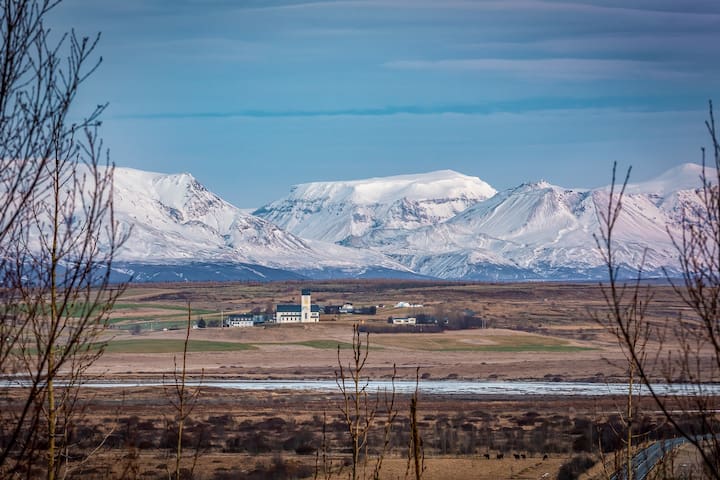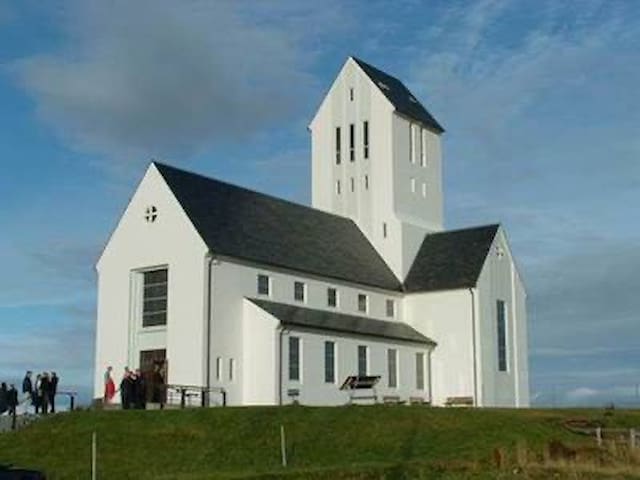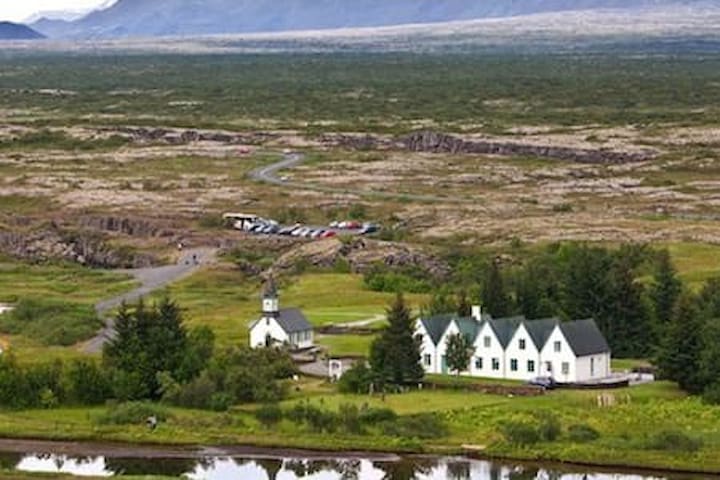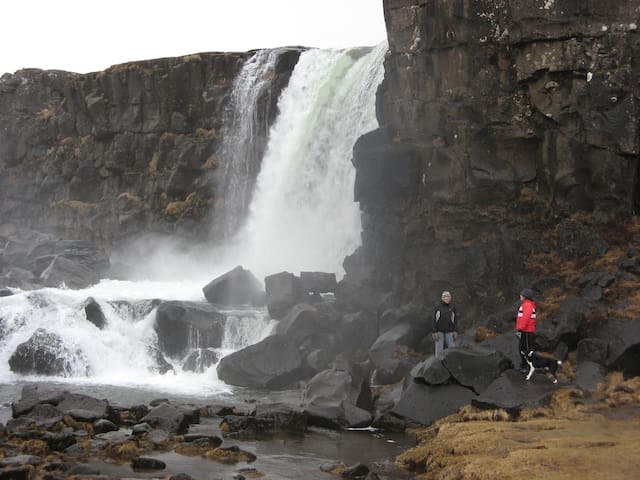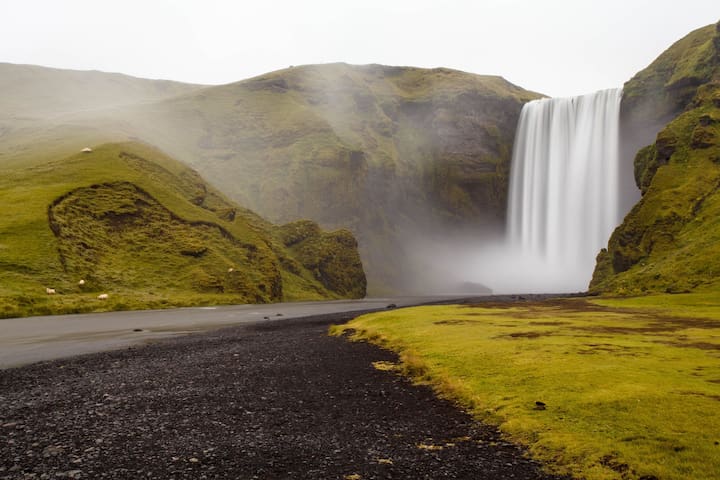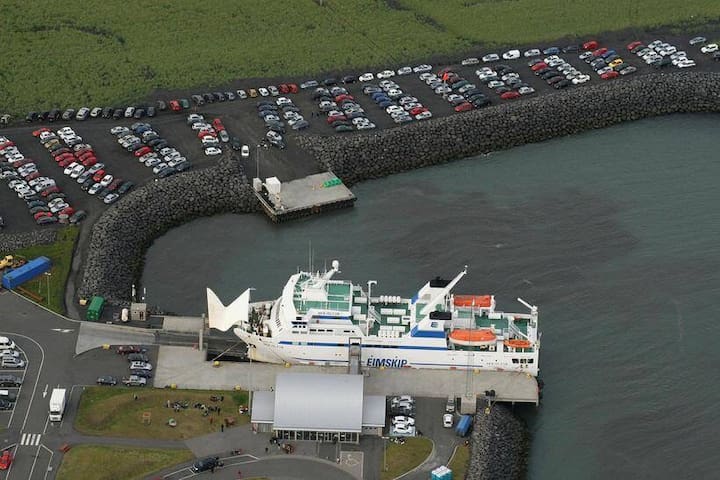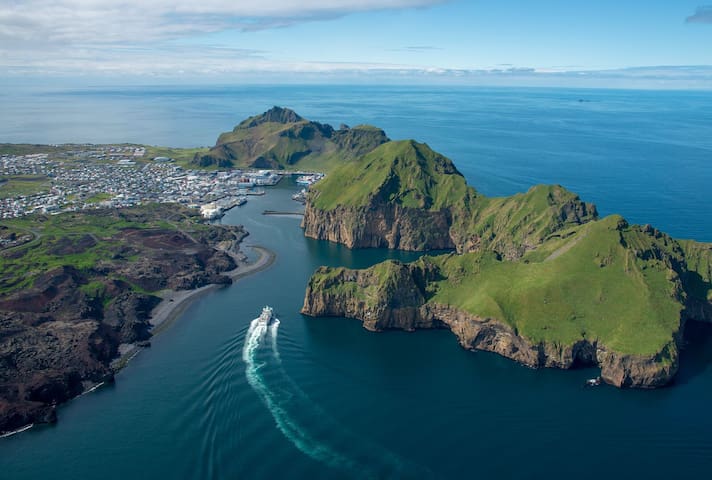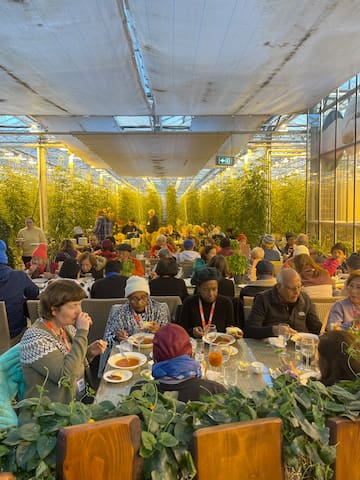Sightseeing
Skálholt cathedral 5 km away from Cabin Sjónarhóll.
See English version skalholt.is
Skálholt
Skálholt
Petting zoo 2 km away from my house. Open during summer months and weekends in may and sept.
38 abantu bendawo batusa
Slakki
Petting zoo 2 km away from my house. Open during summer months and weekends in may and sept.
Secret Lagoon natural hot springs are located in the small village called Fluðir and are in the Golden Circle area. 20 km away From my house Sjónarhóll
134 abantu bendawo batusa
Secret Lagoon Iceland
Hvammsvegur
Secret Lagoon natural hot springs are located in the small village called Fluðir and are in the Golden Circle area. 20 km away From my house Sjónarhóll
Geothermal steem bath and swimming pool 20 km from my house Sjónarhóll. See English version at fontana.is
119 abantu bendawo batusa
Laugarvatn Fontana
LaugarbrautGeothermal steem bath and swimming pool 20 km from my house Sjónarhóll. See English version at fontana.is
Iphakamisa yase-Þingvellir
Iphakamisa yase-Þingvellir
Öxará
Faxi Waterfalls in Tungufljót ( salmon river )25 km away from my house Sjónarhóll.
22 abantu bendawo batusa
Faxi
BiskupstungnabrautFaxi Waterfalls in Tungufljót ( salmon river )25 km away from my house Sjónarhóll.
Kerid Volcanic Crater Lake
Kerid volcanic Crater lake is a 3000-year-old volcanic crater lake on the Golden Circle route in South Iceland, with vivid red slopes and aquamarine water. 25 km away from my house Sjónarhóll
113 abantu bendawo batusa
IKerid Crater
Kerid Volcanic Crater Lake
Kerid volcanic Crater lake is a 3000-year-old volcanic crater lake on the Golden Circle route in South Iceland, with vivid red slopes and aquamarine water. 25 km away from my house Sjónarhóll
Gullfoss, Iceland's most famous waterfall, is one of the country's must-see attractions. 40 km away from my house Sjónarhóll
283 abantu bendawo batusa
Gullfoss
Gullfoss, Iceland's most famous waterfall, is one of the country's must-see attractions. 40 km away from my house Sjónarhóll
Geysir is a hot spring in the geothermal area, Haukadalur Valley, found in South Iceland. 31 km from my house Sjónarhóll
288 abantu bendawo batusa
Geysir
Haukadalsvegur Geysir is a hot spring in the geothermal area, Haukadalur Valley, found in South Iceland. 31 km from my house Sjónarhóll
Seljalandsfoss
Þórsmerkurvegur82 km from Sjónarhóll my house to Seljalandsfoss
Skogafoss Camping
109 km from my house Sjónarhóll to Skógafoss
The ferry to Vestmannaeyjar in Landeyjahöfn 90 km from my cabin. It takes the ferry 35 minutes to sail from Landeyjahöfn to Vestmannaeyja. Further information at Herjólfur.is Tel.4812800
12 abantu bendawo batusa
Landeyjahöfn
LandeyjahafnarvegurThe ferry to Vestmannaeyjar in Landeyjahöfn 90 km from my cabin. It takes the ferry 35 minutes to sail from Landeyjahöfn to Vestmannaeyja. Further information at Herjólfur.is Tel.4812800
Vestmannaeyjabær
Eldheimar
10 GerðisbrautEldheimar, museum
Welcome to Eldheimar, a museum of remembrance.
The exhibition focuses on the 1973 volcanic eruption in Vestmannaeyjar, without a doubt one of Iceland´s biggest natural disaster. Visitors get a glimpse into peoples lives on Heimaey before the eruption that would change their lives forever. The people of Heimaey had to leave their homes in the middle of the night and evacuate the island, many of them never saw their homes or any of their belongings ever again.
The eruption started in the early hours of January 23rd 1973 on the island of Heimaey, the only inhabited island of the Vestmannaeyjar islands and it lasted for 5 months. Lava and ash destroyed almost 400 homes and businesses, a third of all buildings on Heimaey. While the eruption lasted no one knew if the island would ever be populated again.
Before the eruption the population on Heimaey was around 5.300 people. The entire population, apart from about 200 rescue workers who stayed behind, fled to the mainland to live with relatives or in temporary housing where they waited in anguish for what the future would bring.
News of the eruption, that permanently would change the island, traveled fast around the world and when it finally finished, reporters, tourist and scientists from all over the world flocked to Heimaey to see with their own eyes how powerful nature can be. Lava and ash covered 2,5 km2, about 20%, of the island, and a new volcano, Eldfell, had risen 220m tall and Heimaey was now 2 km2 bigger than before.
Now 40 years later Eldheimar open up, a museum of remembrance, giving visitors the chance to go back in time and learn about this dramatic event. The highlight of the exhibition is the house on Gerðisbraut 10, the home to Mrs. Gerður Sigurðardóttir and Mr. Guðni Ólafsson and their 3 young children. With the youngest one only a few weeks old they were forced to leave their home in the middle of the night taking with them only a bottle for the baby. A few days later their home had drowned in ash and lava. Gerðisbraut 10, after being buried in ash and lava for over 40 years, has now been excavated and shows how cruelly nature treated the homes of so many islanders.
The show also covers the Surtsey eruption, the island that emerged from the ocean south of Heimaey in 1963. The Surtsey eruption lasted for almost 4 years and ever since only scientists have been allowed on the island in order to monitor how new ecosystems come to life.
Surtsey was inscribed as a natural property on UNESCO’s World Heritage List during the 32nd session of the The World Heritage Committee in July 2008.
Vestmannaeyjar, i-Iceland
Food scene
Lindin
2 LindarbrautResturant
Restaurant Mika • Skólabraut 4, 801 Reykholt • Tel:(354) 4861110 • Email: mika@mika.is
54 abantu bendawo batusa
Restaurant Mika
SkólabrautRestaurant Mika • Skólabraut 4, 801 Reykholt • Tel:(354) 4861110 • Email: mika@mika.is
Enjoy the special experience of entering a greenhouse and sitting down to a feast of the famous friðheimar tomato soup with freshly baked bread, served with cucumber salsa. Visitors can buy delicious food souvenirs such as Tomato Jam, the Cucumber Salsa and Tomato Drinks to take away.
149 abantu bendawo batusa
Friðheimar
FriðheimarEnjoy the special experience of entering a greenhouse and sitting down to a feast of the famous friðheimar tomato soup with freshly baked bread, served with cucumber salsa. Visitors can buy delicious food souvenirs such as Tomato Jam, the Cucumber Salsa and Tomato Drinks to take away.
HVÖNN RESTAURANT
Hvönn Restaurant in Skálholt is a great place to stop for a meal on your Golden Circle tour. Hvönn means Angelica, which is thought to be the prime herb in the Icelandic flora. In Hvönn Restaurant we focus on old traditional food but we put a modern twist on it.
We work a lot with fermentation like lactic acid, kombucha, and kefir. These are storing methods that Icelanders have used from the first settlements in order to survive harsh winters. But now we use them to make unique and fantastic flavors.
We have a bar at the restaurant where we serve both alcoholic and non-alcoholic beverages
Hvönn Restaurant
HVÖNN RESTAURANT
Hvönn Restaurant in Skálholt is a great place to stop for a meal on your Golden Circle tour. Hvönn means Angelica, which is thought to be the prime herb in the Icelandic flora. In Hvönn Restaurant we focus on old traditional food but we put a modern twist on it.
We work a lot with fermentation like lactic acid, kombucha, and kefir. These are storing methods that Icelanders have used from the first settlements in order to survive harsh winters. But now we use them to make unique and fantastic flavors.
We have a bar at the restaurant where we serve both alcoholic and non-alcoholic beverages

